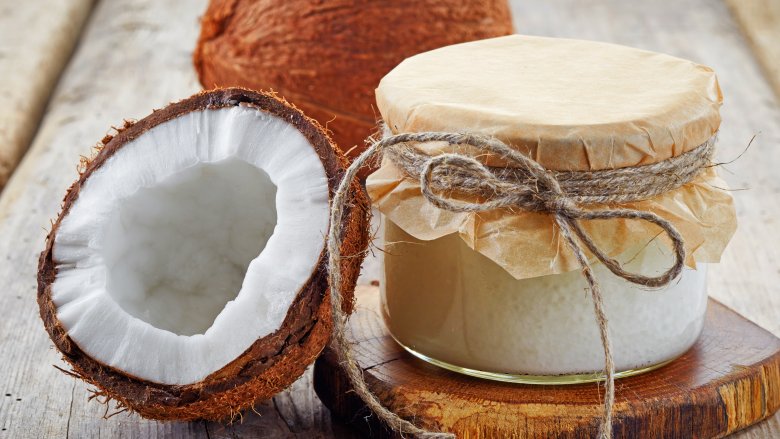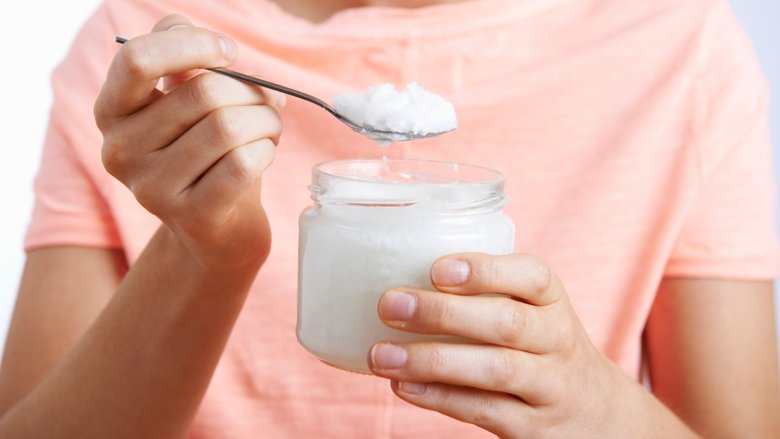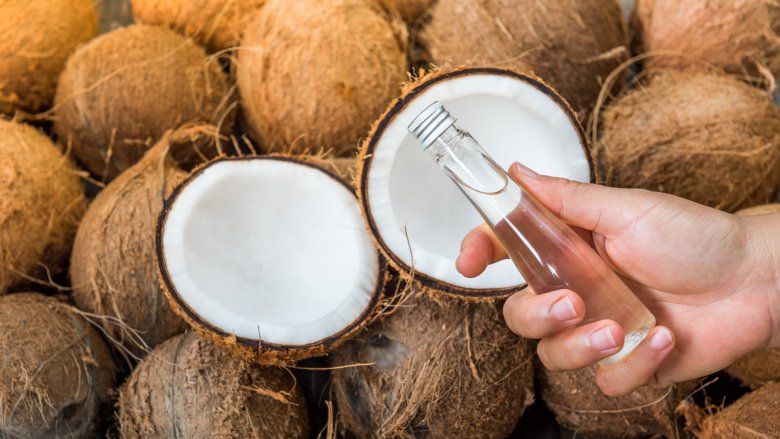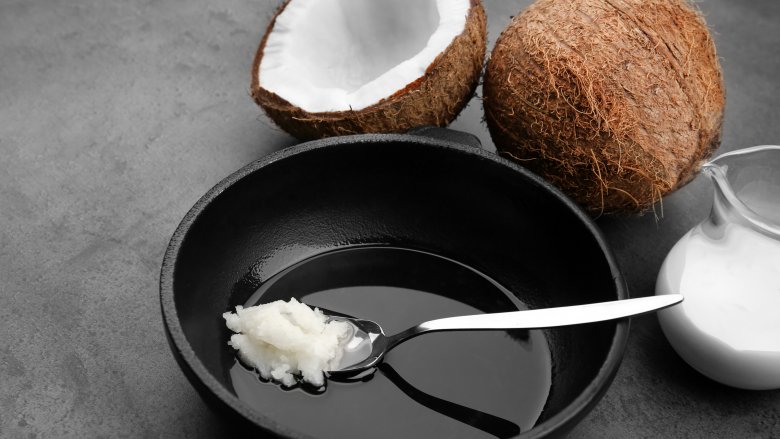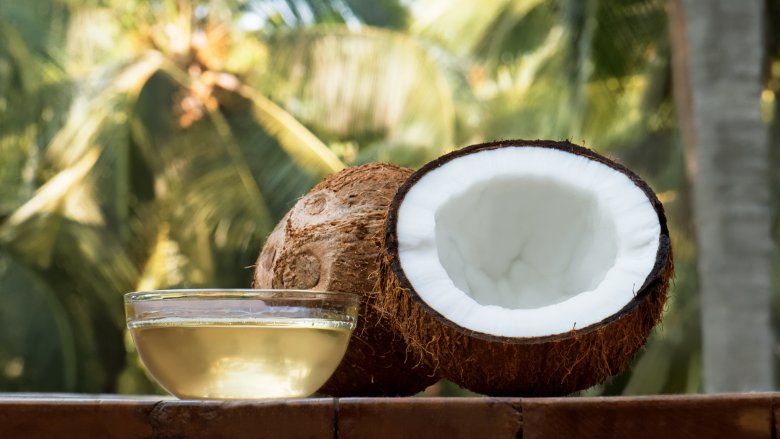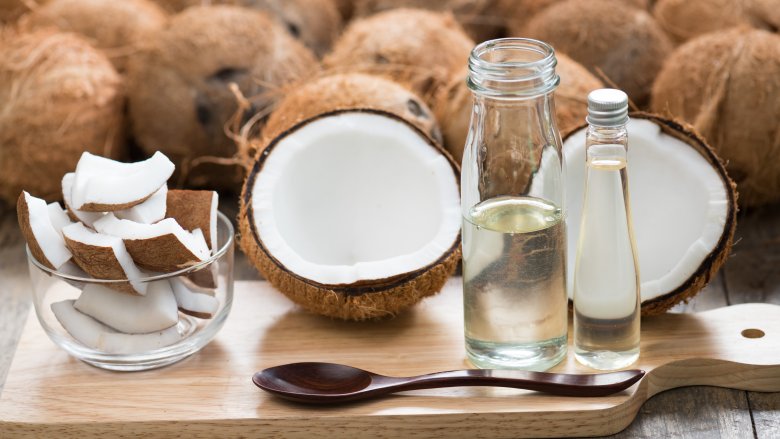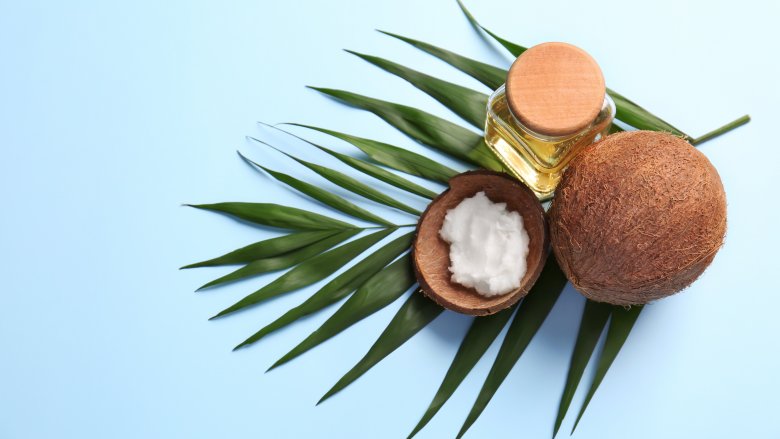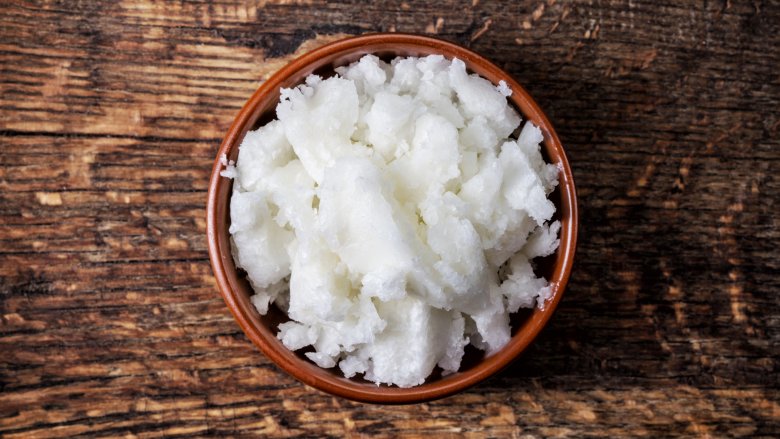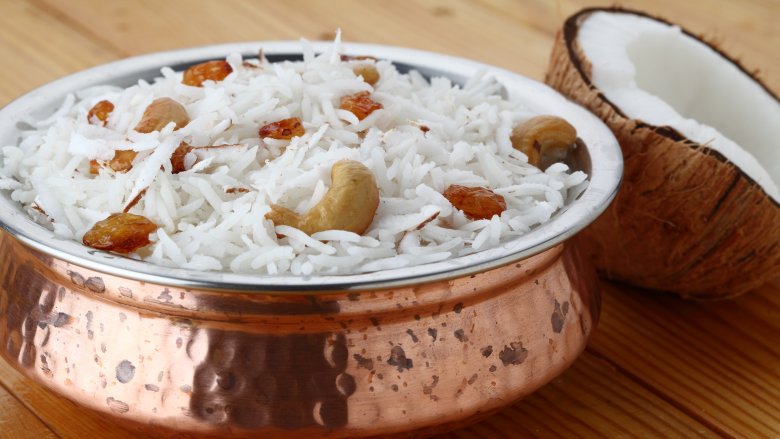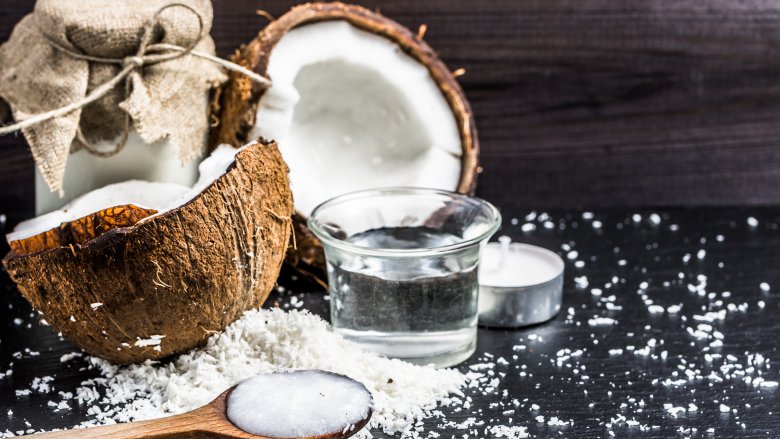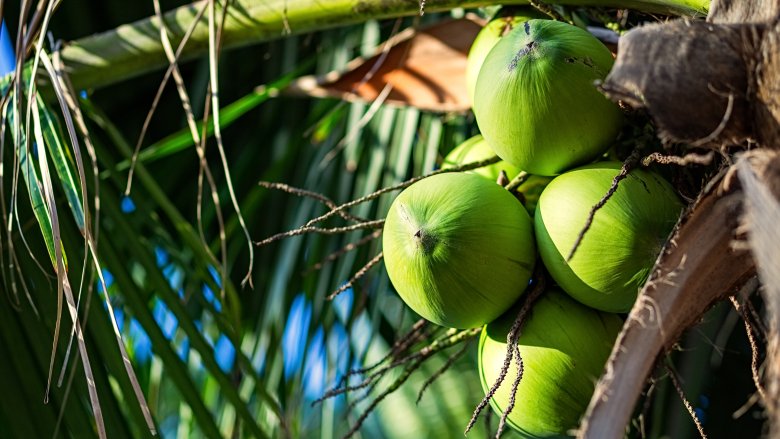The Untold Truth Of Coconut Oil
Superfoods are nutrient-dense, super healthy foods that we all know we should be working into our diets more often. Blueberries, salmon, kale, green tea... and coconut oil? That last one just doesn't seem to fit, but coconut oil has been touted as a health food for years. And we're not just talking about using it in place of butter, we're talking about the people that eat it on a spoon, right out of the jar. Is that healthy?
Coconut oil might seem like a 21st century fad, but strangely, it's not. According to the American Oil Chemists' Society, coconut oil was hugely popular in both Europe and the U.S. beginning at the end of the 19th century. It was widely used to make both soap and foodstuffs, and for a long time, it was one of America's go-to cooking oils. That all changed during World War II, when connections were severed between the nations. Soy became the new thing, and once coconut oil was readily available again, it wasn't as desirable for one simple reason: nutritionists had learned a lot about saturated fats in the intervening years. Coconut oil was largely forgotten about.
Fast forward a few decades and suddenly, it's all the rage again. So, what gives? Is it the healthier option everyone says it is? Let's talk coconuts.
Here's why everyone thinks coconut oil is super healthy
The entire coconut oil fad can be traced back to origins in a single study. In 2003, a study came out of Cornell University Medical School that, at a glance, seemed to suggest adding coconut oil to a diet helped with weight loss. It's no wonder people sort of stopped reading there, because it's exactly the sort of thing you'd want to hear. It wasn't that straightforward, though, and one of the study's lead authors, Marie-Pierre St-Onge explained to Time that the study was less about coconut oil and more about something called medium chain triglycerides.
It was the MCTs that contributed to the weight loss, they found, and while coconut oil does have a higher percentage of MCTs than other oils, it still doesn't have anywhere near the amount used in the study. St-Onge says the research was actually done with a "designer oil" that was 100 percent MCTs, and coconut oil is only between 13 to 15 percent.
Does that lower percentage of MCTs have the same impact as the full-strength stuff? St-Onge has actually published research finding that it doesn't, but trendsetters had already hopped on the coconut oil bandwagon, and there was no looking back.
What does the science on coconut oil actually say?
Coconut oil became incredibly popular before a ton of research had been done on it, and according to Time, there's a lot more research that needs to be done before there's a complete picture on just how good — or bad — coconut oil is. Fortunately, there are some things we do know.
We do know it's an excellent source of lauric acid, which is a compound your body turns into energy for your heart and brain, and which also raises good cholesterol levels, and has microbial properties that seem to destroy bad bacteria in your gut.
According to the Huffington Post, it's also been found that coconut oil contains a lot of something called phytochemicals, which have valuable anti-inflammatory and antioxidant properties that could, in the long run, help prevent the development of certain diseases.
But Stat notes that some of these benefits come with a catch. Take cholesterol. While it has been found to help raise good cholesterol, other oils — like soybean and olive oils — both raise good cholesterol and lower bad cholesterol, making them a healthier choice. Coconut oil doesn't seem to fall clearly in the "good" or the "bad" categories, and that makes it a bit confusing. If in doubt, apply the same philosophy to coconut oil that you should apply to a number of foods: moderation.
Why is most coconut "oil" a solid?
Calling something an "oil" brings to mind something that's a liquid, but pick up a jar of coconut oil, and there's a good chance it's a solid — at least at room temperature. What gives?
According to the Harvard Medical School, coconut oil is a solid because it's so high in saturated fat. Saturated fats are solid at room temperature, and since the fat content of coconut oil can be as much as 90 percent saturated, that makes it a solid. Other "oils" that are higher in unsaturated fats tend to be liquid at room temperature. It doesn't take much to melt it, though: Now Foods says the average melting point of coconut oil is at around 78 degrees Fahrenheit.
Let's just take a minute to compare coconut oil to olive oil. Healthline says that extra virgin olive oil is 13.8 percent saturated fat, and 73 percent monounsaturated fat. Those numbers make a huge difference, and it's a difference you can see when you pick up the bottle.
What's with the liquid versions of coconut oil?
If coconut oil is so full of saturated fat, and saturated fats — including things like lard and butter — are solid at room temperature, why do some grocery stores stock bottles of coconut oil that are liquid? Are they healthier if they're not as fatty?
No, says dietitian Jessica Levinson (via Prevention). The liquid versions of coconut oil are liquid because they've had some of their fatty acids removed, and while that sounds like it might be the better choice, it's not. They've had to go through a ton of extra processing to get those naturally occurring oils removed, so you're better off opting for the minimally processed solid stuff.
According to Healthline, the kind of coconut oil that stays liquid even in the fridge is called fractionated coconut oil, and it's a separate product made from regular coconut oil. In order to get it to stay a liquid, it's had most of the lauric acid removed, and since that's the stuff that brings along some valuable health benefits, you're going to want to stick with the solid.
There's a big difference between refined and unrefined coconut oils
If you're looking at switching to — or continuing to use — coconut oil for the health benefits you hear so much about, you'll need to make sure you're picking up the unrefined stuff. You'll pay a little more, but according to SF Gate, coconut oil labeled "unrefined" is the least processed type you can get.
And that makes a big difference. Unrefined oil comes straight from the coconuts, and goes through a process called wet milling. It's essentially extracted... and that's it. All the nutrients remain intact, all those healthy, fatty compounds are still there, and it will have a strong coconut flavor.
Refined coconut oil is another matter entirely. That's undergone extensive processing known as dry milling, in which coconuts are baked before the oil is removed. Then, that oil is passed through bleaching clay and filtered, which removes a lot of the coconut flavor. Prevention adds that the processes refined versions go through tend to lower the amount of antioxidants in the oil, and that's one of the things you do want. Many refined coconut oils also have partially-hydrogenated fats added, and that's something you should definitely avoid... unless you're planning on using it with a very high heat. In that case, you should know refined coconut oil has a higher smoke point, but still might not be the best choice for the job.
Those studies about coconut oil-using populations aren't complete
One of the things you've probably heard about coconut oil is that certain populations that eat a ton of it are incredibly healthy. The roots of that story go back to a 1981 study that found (via PubMed) the Tokelauans and the Pukapukans of the Polynesian atolls had a diet that was high in saturated fat but still had low instances of heart disease.
That sounds like it's pretty straightforward, but the Harvard School of Public Health warns against drawing any conclusions from that. For starters, there's no proof that their low rates of cardiovascular disease are directly linked to coconut oil, and they also note that the type of coconut eaten as a part of most Polynesian diets is different than the one used in Western oils. They also stressed that whole coconut and coconut milk was more popular than coconut oil, that their diet was overall low in processed foods, and that they also included a lot of fresh fruit, fish, and vegetables that could also account for the trend. The links between saturated fat, coconut oil, and some sort of miracle cure for heart disease is iffy at best.
The American Heart Association doesn't recommend coconut oil
In 2017, the American Heart Association made their stance on coconut oil — and saturated fat — very clear: less is better, and replacing saturated fats with healthier fats had the same beneficial effects as some cholesterol-lowering medications.
And coconut oil was mentioned in their advisory as one of the oils studies looked at, and it wasn't good news for coconut oil fans. It was found that in the overwhelming majority of trials and studies, coconut oil was responsible for raising bad cholesterol levels "significantly." It was significant enough that they couldn't find any reason to recommend using it. In fact, their exact words were: "...we advise against the use of coconut oil."
The advisory took into account more than 100 studies that looked at the effects of saturated fat on the body, and they found that when high-fat sources — like butter and coconut oil — were replaced, it could lower the chances of developing cardiovascular disease by a shocking 30 percent. And that's worth some serious consideration the next time you head to the store to pick up some oil.
Does coconut oil really help with weight loss?
In 2016, The New York Times surveyed both a group of nutritionists and a group of everyday Americans to see whether or not they agreed on how healthy various foods were. When it came to coconut oil, 72 percent of the American public thought it was healthy, while only 37 percent of nutritionists did.
And that could be a problem, says Woman's Day, especially for those who are using it in the hopes of giving their diets a little extra help. While coconut oil is touted as boosting your metabolism, there's a catch: it's those medium-chain triglycerides in the oil that actually have an impact on metabolism, and coconut oil doesn't seem to have enough MCTs to make a real difference.
It's also rumored to keep you feeling full for a longer period of time, reducing how much you're going to want to eat. That's because fats keep you full and coconut oil is, indeed, fat — but if you eat enough coconut oil to get the benefits of satiety, you're also eating way more than the recommended daily limits of saturated fats. It's often said that coconut oil helps with targeted weight loss and is particularly useful for getting rid of pesky belly fat but again, in the quantities used in studies, participants were also getting around twice the amount of saturated fats recommended by the American Heart Association. And that means it's not a consequence-free cure-all.
Coconut oil will change the way you cook rice
So here's something that's pretty cool — using coconut oil to cook rice can actually make that rice healthier.
First, rice. White rice is a staple food around the world, but it has a ton of calories — about 240 per cup — and a lot of starch, not all of which is broken down by the digestion process. Researchers from the College of Chemical Sciences in Sri Lanka reasoned (via Eureka Alert) that if they could turn digestible starches into indigestible starches, they would cut down on the calories. And they did it in a surprisingly easy way.
Researchers boiled half a cup of rice with a teaspoon of coconut oil. After boiling for 40 minutes, they put it in the fridge for 12 hours. The percentage of indigestible starches rose 10 times, and the calories in the rice were cut by as much as 60 percent. The heating and cooling process allows the oil the chance to change the structure of starches in the rice. And who doesn't love a coconut curry?
Coconut oil doesn't really go bad or expire
Everything comes with a best-by date, but what about an expiration date? A date that you absolutely shouldn't use it after? Does coconut oil have one? Kind of, and it's complicated.
According to Eat By Date, virgin and extra-virgin coconut oil will last indefinitely, as long as it's stored right. (Some manufacturers are less generous, and give a max shelf life of 3 to 5 years.)
But they also stress that it's all about the storage. Coconut oil can be stored in the pantry, because according to Does It Go Bad, light can shorten the life of your oil, as can high or constantly fluctuating temperatures. They also note that being sure to always use a clean utensil when scooping is super important, because contaminants can increase the chances of mold growing.
Coconut oil isn't guaranteed to never go bad, though. Mold growth means you'll have to throw out the whole thing, and if there are any odd colors — particularly green, brown, or yellow — that means the oil is turning rancid and you'll need to toss it. If it looks fine, it'll be fine even if the "best-by" date is long passed.
There are some major environmental concerns that go along with coconut oil
The world's obsession with coconut oil hasn't come without an environmental price, says One Green Planet. In fact, if you're trying to be as environmentally-conscious as you can, you might want to skip coconut oil altogether.
Why? For starters, most of the coconuts that went into your coconut oil were grown in either India, the Philippines, or Indonesia. Anyone in the Western world only gets them after they've traveled a long way, and that kind of fuel cost isn't great. What's also not great is the amount of packaging — plastic and glass — that's also needed.
There are major problems to be found on the coconut farms themselves, too. When huge areas are cleared of native species to plant a single crop, it not only destroys habitats, but takes a massive toll on the soil. Farmers grow crop after crop of coconuts, and often turn to replenishing the soil's nutrients with chemical fertilizers. Cheaper is better when it comes to that, as it all impacts just how much money can be made off the crops. Not willing to give up your coconut oil? Look for Fair Trade products, and don't forget to recycle your containers.
Coconut oil might not be as ethical as it is trendy
Fair Trade Certified says the demand for coconut products is rising at a rate of about 10 percent each year, and while it seems like that might be a good thing for farmers, it's not. Findings from the National Anti-Poverty Commission are troubling; most coconut farmers in the three biggest coconut-producing countries — India, Indonesia, and the Philippines — live well below the poverty line, and earn an average of $1 a day.
According to The Guardian, most coconut farmers only have one outlet when it comes to selling their harvest, and that means they have no choice but to take the prices they're offered. Those prices fluctuate — a lot — and it makes a tough job even tougher when you can't forecast how much you're going to make on a harvest.
Another part of the problem is coconut trees live for around 100 years, but only yield a large number of coconuts when they're between 10 and 30. Given that they don't start producing until they're around 5 years old, that means coconut farmers are always investing in planting new trees and tearing out the old ones. That investment has only gotten worse, with environmental changes like typhoons, pests, and irregular weather patterns putting further strain on farmers. It's no wonder that the younger generation of potential farmers are getting out of the industry when they can, and time will tell how viable coconut farming — and products — will continue to be.
